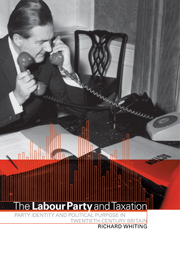Book contents
- Frontmatter
- Contents
- List of tables
- Acknowledgements
- List of abbreviations
- Introduction: Taxation and political debate
- 1 Struggles within a liberal inheritance, 1906–1940
- 2 The changing balance of tax interests, 1940–1954
- 3 The Kaldor era, 1951–1965
- 4 Social democracy examined, 1965–1970
- 5 Defensive positions, 1970–1979
- 6 Epilogue: New Labour, old problems?
- 7 Conclusion
- Select bibliography
- Index
Introduction: Taxation and political debate
Published online by Cambridge University Press: 07 August 2009
- Frontmatter
- Contents
- List of tables
- Acknowledgements
- List of abbreviations
- Introduction: Taxation and political debate
- 1 Struggles within a liberal inheritance, 1906–1940
- 2 The changing balance of tax interests, 1940–1954
- 3 The Kaldor era, 1951–1965
- 4 Social democracy examined, 1965–1970
- 5 Defensive positions, 1970–1979
- 6 Epilogue: New Labour, old problems?
- 7 Conclusion
- Select bibliography
- Index
Summary
This study brings together the twentieth-century tax system and the history of the Labour Party. Its subject is the way the party used taxation to fulfil its political purpose, and the degree to which that was shaped by its strategy, the capability of the revenue departments, and social attitudes. Political parties have been regarded by some social scientists as making poor use of the powers of government, and this has been true for taxation as for other functions of the state. One study of the period 1965–74, which saw many plans for reform but few results, concluded of both Conservatives and Labour that ‘They could pay more attention to the internal logic of their ideological positions and refine and clarify their objectives.’ Not only have parties been poor at deciding exactly what they want to do, but they have also, according to some writers, prevented the achievement of the best policy solutions because of their injection of unhelpfully adversarial pressures into government. But taxation, even in its details, is so powerfully connected with ultimate political values that it could not be divorced from the party struggle. The main body of this book analyses Labour's performance in this intricate part of government. It does so selectively. I am primarily concerned with the national tax system; local government finance is viewed episodically from this perspective, while special taxes on land have also received less attention than others might think they deserve.
- Type
- Chapter
- Information
- The Labour Party and TaxationParty Identity and Political Purpose in Twentieth-Century Britain, pp. 1 - 7Publisher: Cambridge University PressPrint publication year: 2001



